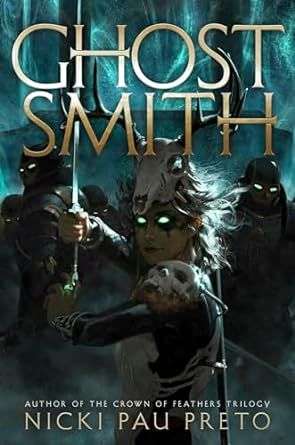
For all things fantasy, horror, and speculative fiction

Review Details
Review type: Book
Title: Ghostsmith
Author: Nicki Pau Preto
Publisher: Hodderscape
Release date: 15th August 2024

Reviewed by: Sarah Deeming
Other details: Hardback, £22
Ghostsmith by Nicki Pau Preto
Book Review
Sarah Deeming
Wren is on the run from her father, discovering that behind the scenes, he has been manipulating events and people to form an alliance with the Corpse Queen and gather more power. But it is just Wren, Leo, the third prince of the House of Gold, and Julian Knight of the House of Iron against all of the House of Bone and the House of Iron. Recapture seems inevitable until Wren’s long-lost twin brother, Hawke, offers to help them destroy the Breach, which destroys the Corpse Queen and stops their shared father.
But the living are more untrustworthy than the dead. Julian can’t forgive Wren for abandoning him. Wren must grapple with the full revelations of her father’s betrayals and the wider ramifications on the world. Fighting their way through a landscape of the dead whose touch can rot living flesh is just the start. If they can’t work together, then the whole of the Dominion is doomed.
Ghostsmith is the final book in Preto’s The House of the Dead duology and picks up exactly where Bonesmith finishes with the three main characters, Wren, Leo, and Julian, still reeling from discovering Wren’s father has been involved in every misfortune that has befallen them, and that the Ghostsmiths, whom everyone believed had died during the war twenty years ago, are still alive. We also have the tension between Wren and Julian after she tied him up and abandoned him before returning home. He feels betrayed by her actions even though they are in his best interests, and she suffers from guilt because she only wanted him safe but handled it badly. Their relationship is very cute, where both are capable of pettiness and thoughtless cruel words, but also for self-reflection and growth, as they understand that holding on to the past only hampers their future.
My favourite character is Leo, the third son of the king of the House of Gold. He uses the phrase the spare’s spare to describe his position in the house and is often self-deprecating. In Ghostsmith, he flourishes as the situation is out of control. We see him use his affinity with gold to bend strands of it into lockpicks or other useful tools, throw people around by their gold jewellery and even use gold makeup to mark paths for people. I enjoyed this aspect of his character because it made him realise he was so much more than an embarrassment to his family.
I loved the world-building in this duology. There is magic, but it isn’t really called that. People are assigned to houses depending on what material they can manipulate, and each house has a structure that depends on how well a person can manipulate it. The different levels of dead, from harmless ghosts up to liches, were interesting, and I liked the contrast between how Wren viewed the dead and how Hawke did, who had only ever known the dead rather than the living, growing up as he did in the Breach. If I have any complaint, it is that towards the end, we moved more towards telling readers events rather than showing us them, so it felt a little rushed. That said, I did love this book; in fact, I loved both books. They have satisfyingly complimented front covers and were really fun to read, so I will overlook any minor complaint I have because they will definitely be rereads for me. Highly recommended.
Tags: ActionAdventureFantasyHodderscapeHorrorNicki Pau Preto
Category: Book Review
All reviews
Latest Reviews:
- Basic Roleplaying: Creatures
- Five Mini-Adventures – PDF (Shadowdark RPG)
- Cursed Scroll Zine, Vol. 1: Diablerie! RPG Zine
- Empire of the Dawn by Jay Kristoff
- The God and the Gumiho by Sophie Kim
- Citadel of the Moon by Mike Chinn
- Hemlock and Silver by T. Kingfisher
- Thirsty by Lucy Lehane
- Solodark RPG
- Shadowdark RPG
Review tags:
Action (49) Adventure (70) Contemporary Fantasy (18) Fantasy (120) Gothic Horror (12) Harper Voyager (12) Historical Fantasy (14) Hodderscape (12) Horror (75) Orbit Books (33) Romance (28) Romantasy (12) Science Fiction (35) Titan Books (36) TorDotCom (12)
Leave a Reply